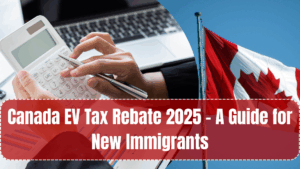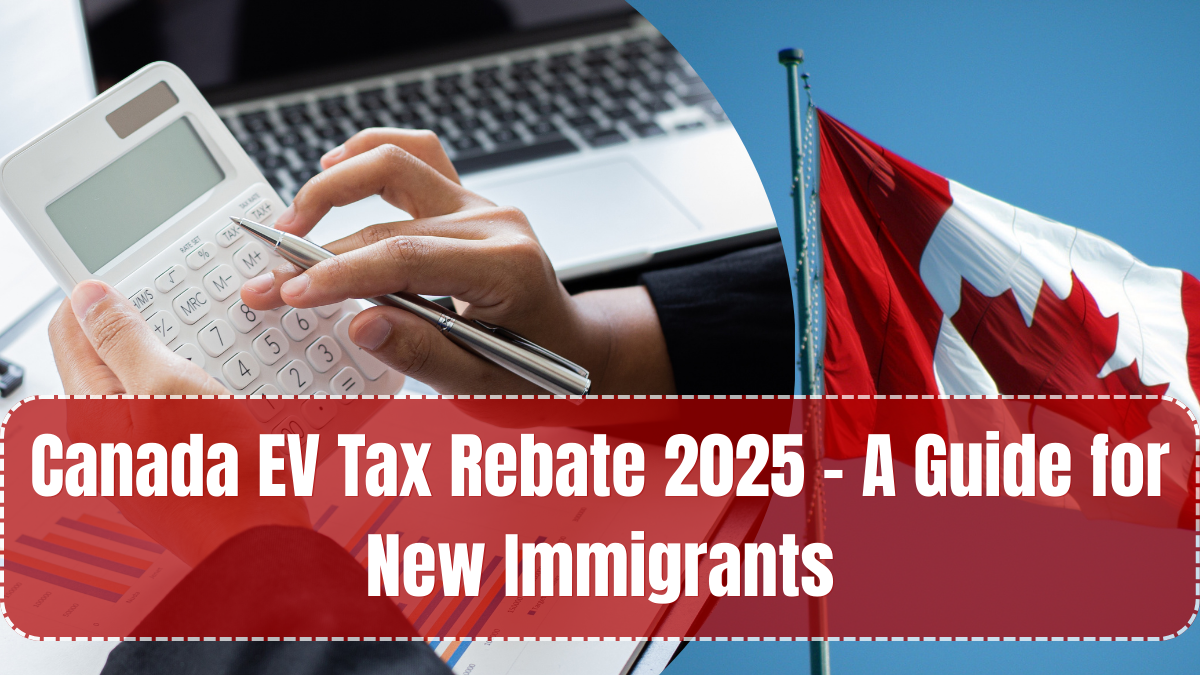The EV tax rebate Canada program in 2025 offers excellent benefits for new immigrants looking to purchase an electric vehicle (EV). With Canada pushing aggressively toward zero-emission transportation, the government has designed inclusive rebate policies that also cover permanent residents, work permit holders, and recent international arrivals. These financial incentives aim to reduce the upfront cost of owning an EV while encouraging more people—especially newcomers—to adopt green mobility.
Whether you’ve just landed in Ontario or moved to British Columbia on a PR, this guide explains how you can access the EV rebate and enjoy lower costs on your first vehicle in Canada.

What Is the EV Tax Rebate in Canada?
The EV tax rebate Canada is a federal and provincial financial assistance program that refunds part of the cost of purchasing a new electric vehicle. As of 2025, buyers can receive up to $5,000 from the federal iZEV Program and an additional $2,000–$7,000 from provincial incentives, depending on where they reside.
Key benefits available in 2025:
-
Federal iZEV rebate: Up to $5,000 for eligible EVs under $70,000
-
Provincial top-up (e.g., BC: $4,000, Quebec: $7,000, Nova Scotia: $3,000)
-
Combined rebates of up to $12,000
-
Rebates applied at the point of sale (no wait for tax season)
-
Eligibility open to permanent residents, work/study visa holders, and refugees
These rebates make it easier for immigrants to purchase their first EV without financial stress.
Who Is Eligible for the Canada EV Tax Rebate?
New immigrants in Canada are fully eligible for both federal and provincial EV rebate programs if they meet the following conditions:
Eligibility Criteria:
-
Must be a Canadian resident (PR, work permit, student visa, or refugee status)
-
Must purchase or lease a new, eligible zero-emission vehicle (ZEV)
-
Vehicle must be below the price cap ($70,000 for passenger vehicles, $75,000 for SUVs)
-
Lease term must be at least 12 months (if leasing)
-
Vehicle must be registered and primarily used in Canada
Used EVs are not eligible under the federal iZEV program but may be covered under some provincial incentives (e.g., Quebec and Nova Scotia).
How New Immigrants Can Claim the EV Rebate
Claiming the EV tax rebate Canada is a simple process that’s mostly handled by the dealership. New immigrants can receive the rebate instantly at the time of purchase or lease by presenting the correct documents.
Steps to claim your EV rebate:
-
Choose an eligible EV model from the iZEV-approved list
-
Visit a dealership that participates in the federal program
-
Present identification (passport, visa/PR card, proof of address)
-
Sign a rebate acknowledgment form at the dealership
-
Get the rebate applied instantly to your final vehicle cost
-
For provincial rebates, apply separately (online or paper form depending on province)
Some provinces like Quebec and BC have online portals where immigrants can submit documents post-purchase to claim their rebate.
Documents Required for Rebate Application
Having the correct paperwork helps ensure your rebate is processed without delays. New immigrants should carry both legal ID and proof of residence when purchasing their EV.
Required documents include:
-
Government-issued photo ID (Passport or PR card)
-
Immigration status proof (Work permit, student visa, COPR)
-
Utility bill, lease, or bank statement as address proof
-
Signed purchase or lease agreement from a licensed dealership
-
Federal and provincial rebate application forms (if applicable)
Always double-check with the dealership and your province’s rebate portal to ensure no document is missing.
FAQs
Can new immigrants apply for the EV tax rebate in Canada?
Yes, new immigrants with PR, work permits, or study visas are eligible for both federal and provincial EV rebate programs in Canada.
How much rebate can I get on a new EV in 2025?
You can receive up to $5,000 from the federal iZEV program and an additional $2,000–$7,000 from your provincial government.
Is the rebate applied at purchase?
Yes, most EV rebate amounts are applied at the dealership when you buy or lease the car. Some provinces require you to apply online afterward.
What documents are needed to claim the rebate?
You need ID (passport or PR), proof of immigration status, proof of address in Canada, and the vehicle purchase or lease agreement.
Are used EVs eligible for rebates?
Used EVs are not covered by the federal rebate but may be eligible for provincial rebates in some areas like Quebec or Nova Scotia.
Click here to know more.
